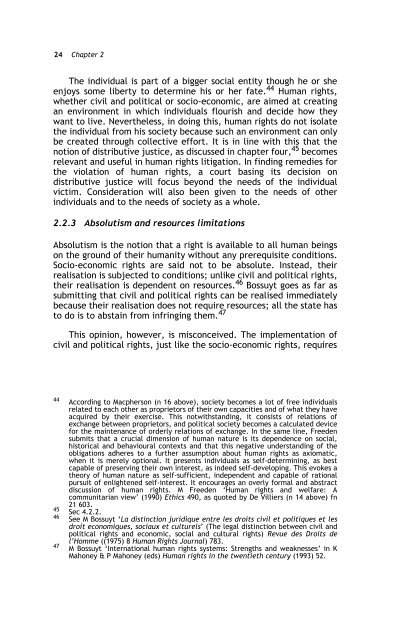LITIGATING SOCIO-ECONOMIC RIGHTS IN SOUTH AFRICA - PULP
LITIGATING SOCIO-ECONOMIC RIGHTS IN SOUTH AFRICA - PULP
LITIGATING SOCIO-ECONOMIC RIGHTS IN SOUTH AFRICA - PULP
Create successful ePaper yourself
Turn your PDF publications into a flip-book with our unique Google optimized e-Paper software.
24 Chapter 2<br />
The individual is part of a bigger social entity though he or she<br />
enjoys some liberty to determine his or her fate. 44 Human rights,<br />
whether civil and political or socio-economic, are aimed at creating<br />
an environment in which individuals flourish and decide how they<br />
want to live. Nevertheless, in doing this, human rights do not isolate<br />
the individual from his society because such an environment can only<br />
be created through collective effort. It is in line with this that the<br />
notion of distributive justice, as discussed in chapter four, 45 becomes<br />
relevant and useful in human rights litigation. In finding remedies for<br />
the violation of human rights, a court basing its decision on<br />
distributive justice will focus beyond the needs of the individual<br />
victim. Consideration will also been given to the needs of other<br />
individuals and to the needs of society as a whole.<br />
2.2.3 Absolutism and resources limitations<br />
Absolutism is the notion that a right is available to all human beings<br />
on the ground of their humanity without any prerequisite conditions.<br />
Socio-economic rights are said not to be absolute. Instead, their<br />
realisation is subjected to conditions; unlike civil and political rights,<br />
their realisation is dependent on resources. 46 Bossuyt goes as far as<br />
submitting that civil and political rights can be realised immediately<br />
because their realisation does not require resources; all the state has<br />
to do is to abstain from infringing them. 47<br />
This opinion, however, is misconceived. The implementation of<br />
civil and political rights, just like the socio-economic rights, requires<br />
44 According to Macpherson (n 16 above), society becomes a lot of free individuals<br />
related to each other as proprietors of their own capacities and of what they have<br />
acquired by their exercise. This notwithstanding, it consists of relations of<br />
exchange between proprietors, and political society becomes a calculated device<br />
for the maintenance of orderly relations of exchange. In the same line, Freeden<br />
submits that a crucial dimension of human nature is its dependence on social,<br />
historical and behavioural contexts and that this negative understanding of the<br />
obligations adheres to a further assumption about human rights as axiomatic,<br />
when it is merely optional. It presents individuals as self-determining, as best<br />
capable of preserving their own interest, as indeed self-developing. This evokes a<br />
theory of human nature as self-sufficient, independent and capable of rational<br />
pursuit of enlightened self-interest. It encourages an overly formal and abstract<br />
discussion of human rights. M Freeden ‘Human rights and welfare: A<br />
communitarian view’ (1990) Ethics 490, as quoted by De Villiers (n 14 above) fn<br />
21 603.<br />
45 Sec 4.2.2.<br />
46 See M Bossuyt ‘La distinction juridique entre les droits civil et politiques et les<br />
droit economiques, sociaux et culturels’ (The legal distinction between civil and<br />
political rights and economic, social and cultural rights) Revue des Droits de<br />
l’Homme ((1975) 8 Human Rights Journal) 783.<br />
47<br />
M Bossuyt ‘International human rights systems: Strengths and weaknesses’ in K<br />
Mahoney & P Mahoney (eds) Human rights in the twentieth century (1993) 52.
















